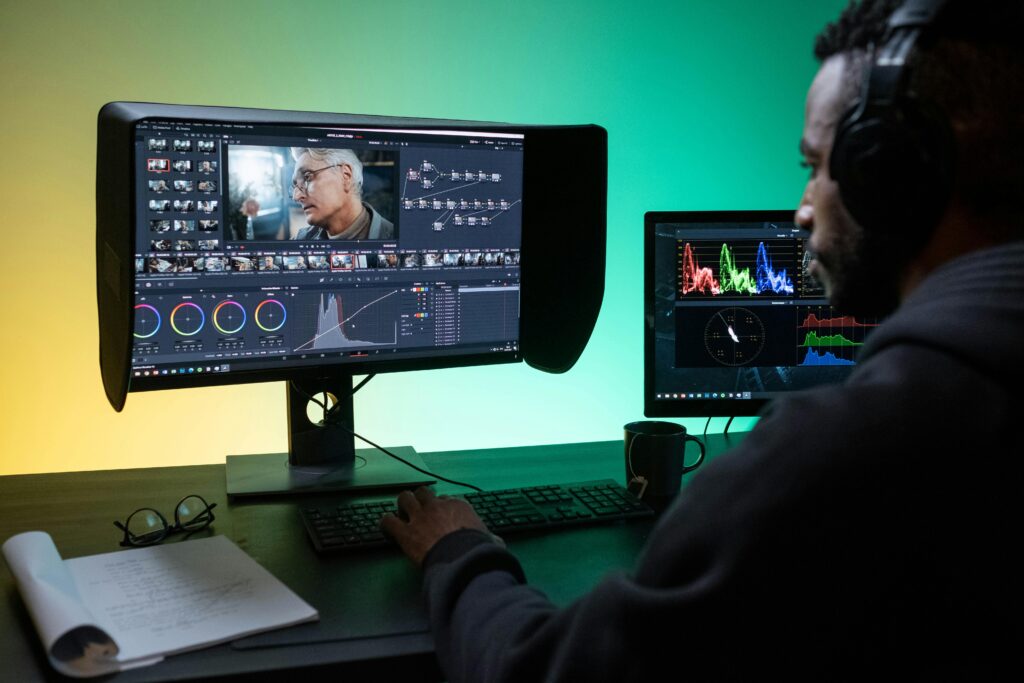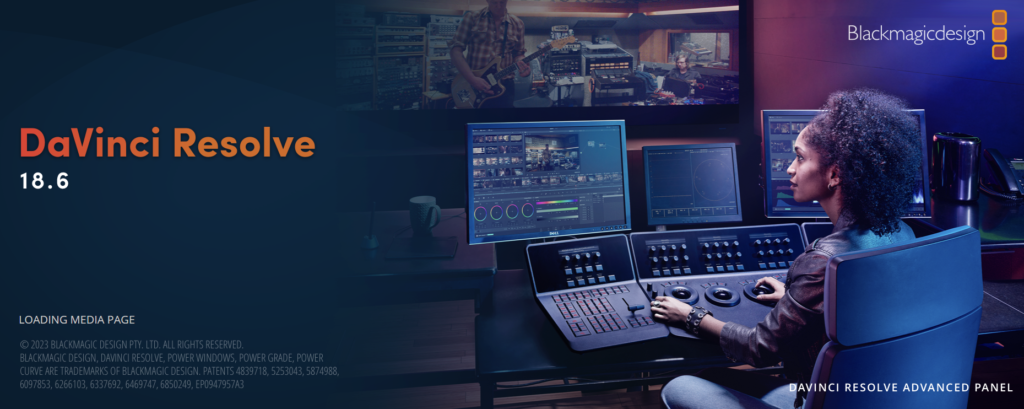Introduction

In this digital age, video has emerged as the most powerful tool for communication and promotion. With 55% of internet users dedicating their entire online time to video consumption, the demand for skilled video editors has never been higher.
Businesses and brands have adjusted their marketing to video before considering other forms of online communication. As a result, the demand for video editors has significantly increased over the last 3-5 years.
This trend will continue as online players look to produce and have their videos professionally edited to compete on the internet and social media platforms.
This guide presents a promising opportunity for those looking to make a career out of video editing. Video quality in content and editing influences how that video will perform, especially on platforms like YouTube and TikTok.
If you want to make a career and money from video editing, you’re at the right place. This guide will walk you through where to get free learning materials and editing software and how to market your newly acquired skills to acquire customers online.
The Role of a Professional Video Editor

As a professional video editor, your role is multifaceted. You’re not just assembling raw footage, cutting and trimming, adding effects, synchronizing audio, and color grading.
You’re also the architect of the video’s narrative, ensuring it captivates the audience from start to finish. A professional video editor must ensure the video will capture the viewers’ attention and have them watch the entire video.
You must integrate a comprehensive storytelling style through technical editing and cinematic prowess to capture viewers’ attention. Below are the essential skills and responsibilities of a video editor:
- Importing and organizing video raw footage
- Cutting and trimming clips
- Adding effects, transitions, titles, and subtitles
- Syncing audio and adjusting sound levels
- Professional color correction and grading of the clips
- Exporting the final clips or footage in various formats
Where to Start: Required Skills and Software
To be a professional video editor, you must master technical and cinematic storytelling skills to keep viewers watching and coming back to watch more of your videos.
Technical Skills
Video Editing Software Proficiency

Familiarize yourself with industry-standard software such as DaVinci Resolve, Adobe Premier Pro, and Final Cut Pro. In this guide, we’ll focus on DaVinci Resolve, which has a free and studio version.
The free version has almost all the features of the studio version necessary to produce professional-standard videos. It’s also the standard video color correction and grading software.
DaVinci Resolve is the number one video editing software used in producing Hollywood movies. As of this year, 70% of video editors have shifted from other software to DaVinci Resolve, which has more advanced features and is easy to learn.
There are dozens of free online content on mastering video editing on DaVinci Resolve, especially on YouTube.
Master Video Formats and Codecs
As a video editor, you must learn all video formats and resolutions, depending on whether you edit your video for mobile or desktop viewing. Videos posted on social media and YouTube shorts usually have different resolutions and formats than those meant for viewing on a desktop or television.
Need for Basic IT Skills
Video editors must know how to troubleshoot computer hardware and software. This will save them time and potential frustration while editing.
Creative Cinematic Skills
Storytelling
A professional video editor should be able to craft an intriguing story through visuals, inspiring creativity and innovation in their work. You must understand how to pace a video and play with synchronized audio, shot composition, and transitions.
YouTube channels like The Editing Podcast delve into how to bring about storytelling on video to hook viewers.
Attention to Details
Small details can make a big difference in the quality of the final footage. Therefore, it’s crucial to focus on being precise in your editing, cutting unnecessary fluff, and making the video entertaining or informative to your viewers.
Music and Sound Effects
Sound is an integral part of the video. Sound can make an average footage a better final product. You can achieve this by cutting and trimming your footage to audio beats or pacing the sound to trigger emotional effects.
Focus on synchronizing your audio well with the footage, balance your audio levels, and have only the necessary sound effects.
Learning Materials and Resources
Numerous online learning materials are sufficient to learn everything you need to know about DaVinci Resolve. YouTube is the primary free learning site in the world.
YouTube has well-crafted and structured courses and tutorials on DaVinci Resolve, from beginner to expert-level quality. YouTube channels like Casey Faris have world-class tutorials and insights into DaVinci Resolve.
Additionally, join Reddit and Discord communities, like Video Editor, where other video editors share valuable tips and insights on video editing. You want to keep in touch with changing industry norms and trends.
Building Your Videos Portfolio: Hands-On Practice
Like any other skill, practice consistently to become a professional video editor. Here, focus on building your video portfolio to showcase your skills with potential clients and colleagues.
Focus on ways to do this without spending any money at this stage:

- Shoot Personal Projects: Create short videos and edit them to sharpen your video editing skills. Start a YouTube channel covering your favorite niche. You can edit football, car, or travel clips and upload them to YouTube. Your primary focus here is not to make money through YouTube but to gauge your skills as you build your portfolio. Volunteer to edit videos for local businesses, creating content to market and showcase their products. This will give you much-needed market experience, add more to your video portfolio, and introduce you to potential clients who will pay you for your work in the future.
- Join Other Video Editors Online Communities: It is an ideal channel to find collaboration work or meet potential customers. Also, look for film and influencers online who may need video editors to edit their projects.
How to Monetize Your Video Editor Skills for Free
Now that you have developed your skills and have a fully-fledged portfolio of videos to showcase, the next step is to start making money as a video editor. Start on platforms and methods that are easy to get clients on.
As a Freelancer
Freelancing is a high-income source and offers high flexibility to engage yourself in different types of work related to video editing. Here, you can have access to several clients, thus boosting your chance of making more money.
Create free accounts on sites like freelancer.com, Fiverr.com, or Upwork.com.
- Create a Compelling Profile: Build a professional profile on these platforms and focus on showcasing your skills by sharing some of your work in your portfolio.
- Engage Potential Clients and Other Video Editors: Engage on these platforms to grow your network.
Content Creation Online
After conquering freelance work, the next step is to start creating video content online. Share tips on video editing, how other video editors can build their video portfolio, or how to reach out to potential clients.
- YouTube, Instagram, and Tik-Tok: Monetize your content through ads, affiliate marketing, brand sponsorships, or merchandise like T-shirts or clothes.
- Create Stock Footage: Start creating templates that can be useful to other video editors to make their work easier and faster. These footage or templates are in high demand on platforms like Pexels.com or Pixabay.com.
Building Your Brand as a Video Editor

The next step is creating and growing your video editor brand. You want your clients and potential clients to associate you with a particular set of skills and values.
Focus on Niche Expertise
Market yourself as an expert in a specific area, not a general video editor. Attract niche-specific high-paying clients looking for a video editor with your skills.
Social Media Presence
- LinkedIn and X: Create social media accounts to market your skills further and engage and interact with other video editors and potential clients. Create video snippets showcasing your latest tricks and blog about trends and changes in the industry. Build a following from upcoming video editors and clients, strengthening your status as an industry expert.
Network
Engage other video editors on Discord and Reddit communities. Share what you learn and share your opinions on different video editing areas of expertise.
This acts as the base for networking, avenues for future collaborations, or work that your colleagues might feel you’re the most suitable person to execute.
Building a Free Website
- Your Portfolio: As a professional video editor, you need a website to build your portfolio of professional videos. Potential clients will visit your portfolio to see your work when they search on Google or find your profile on social platforms. You want a professional website that loads well and is well-structured to attract potential clients. You can find free website builders sites like WordPress.com or Wix.com, which come with cheap hosting fees.
- Google Search Engine Optimization: Look for ways to optimize your website content for SEO. SEO makes it easier for people to find your website when searching on Google. This is another organic-free way of marketing your expertise on the Internet without spending much time or money. By optimizing your content for SEO, Google will rank it higher on its index, making it easily found in searches.
Conclusion

Becoming a video editor and starting to make money online is easy. However, serious work is required to acquire and build your skills professionally.
The market for video editors keeps growing, and even with the growth of artificial intelligence editing sites, people want human-edited videos with better storytelling and emotional feel.
Leverage the free materials shared in this guide to start and learn your way to your dream. Building a professional video portfolio is integral to putting your skills on the market.
Join social media platforms and online communities to market yourself and your brand by creating content and offering expert advice on industry queries.
Whether you choose to go freelance full-time or start an agency in the future, these are the beginner steps you have to take to market your skills through quality work.
Happy money-making and starting your new hustle to profit.